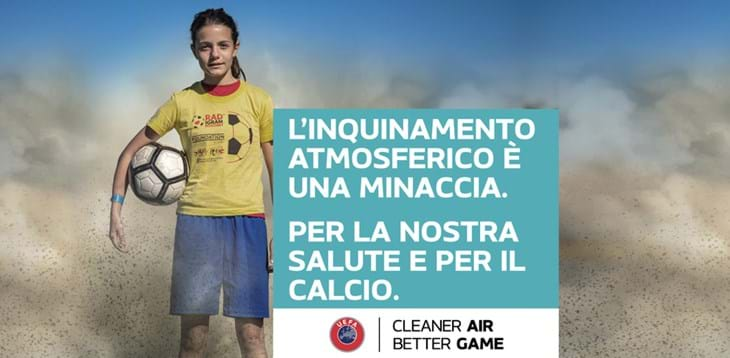
The FIGC and Fondazione AIRC sign memorandum of understanding
09 November 2023
 FIGC supports UEFA's 'Cleaner Air, Better Game' campaign against pollution
FIGC supports UEFA's 'Cleaner Air, Better Game' campaign against pollution
Friday, June 9, 2023

For the Under 21 European Championships, scheduled to take place on Romania and Georgia from 21 June until 8 July, the FIGC is supporting UEFA's 'Cleaner Air, Better Game' campaign. The initiative, that first appeared in the last Under-21 tournament, aims to raise public awareness on the damaging effects of air pollution on individuals' health, that according to the WHO (World Health Organization) kills over seven million people a year. Poor air quality also has a negative effect on footballers' health, with studies showing that higher levels of air pollution can slow the tempo of a game down by up to 15%.
The 'Cleaner Air, Better Game' campaign carries out a vital role in promoting a collective effort in monitoring and trying to reduce carbon emissions during the Under-21 Euros. From national federations and players to fans, volunteers and workers, all interested parties are encouraged to adopt environmental practices through a series of initiatives that will be organised by host cities. These initiatives will be focused on waste management, cleaning measures adopted by local communities and plans for sustainable travel to/from stadiums. Through the campaign, UEFA is not only sending out a strong message to the footballing community that a cleaner future is beneficial but that it is attainable with the actions and hard work of everyone.
For the duration of the Euros, UEFA, along with the Georgian and Romanian federations, will prioritise environmental, social and governance principles in the event's operations, in line with the strategic approach outlined for the tournament. On the environmental front, the organisers will conduct analysis on how fans move around during the competition, closely monitoring the carbon emissions produced, reduce generators use to a minimum for TV broadcasting, and introduce separate bins and containers for recycling waste. UEFA and local footballing associations will also organise a workshop on climate during the tournament to share best practices and develop innovative solutions for reducing carbon emissions. The workshop will be a platform for dialogue and collaboration on environmental matters in Football.
Finally, the host nations will give priority to governance in pushing UEFA's sustainable strategies and practices by publishing them in the local language, conducting consultation with stakeholders, providing educational courses to workers and volunteers about ESG matters (Environment, Social and Governance), launching a campaign to raise public awareness about air pollution and declaring its performance based on ESG parameters.
Infine, le nazioni ospitanti daranno priorità alla governance pubblicando la strategia di sostenibilità dell'evento UEFA nelle lingue locali, conducendo consultazioni con gli stakeholder, fornendo formazione al personale e ai volontari sui temi ESG (ambientali, sociali e di governance), lanciando una campagna di comunicazione per sensibilizzare l'opinione pubblica sull'inquinamento atmosferico e divulgando le proprie performance sui parametri ESG.